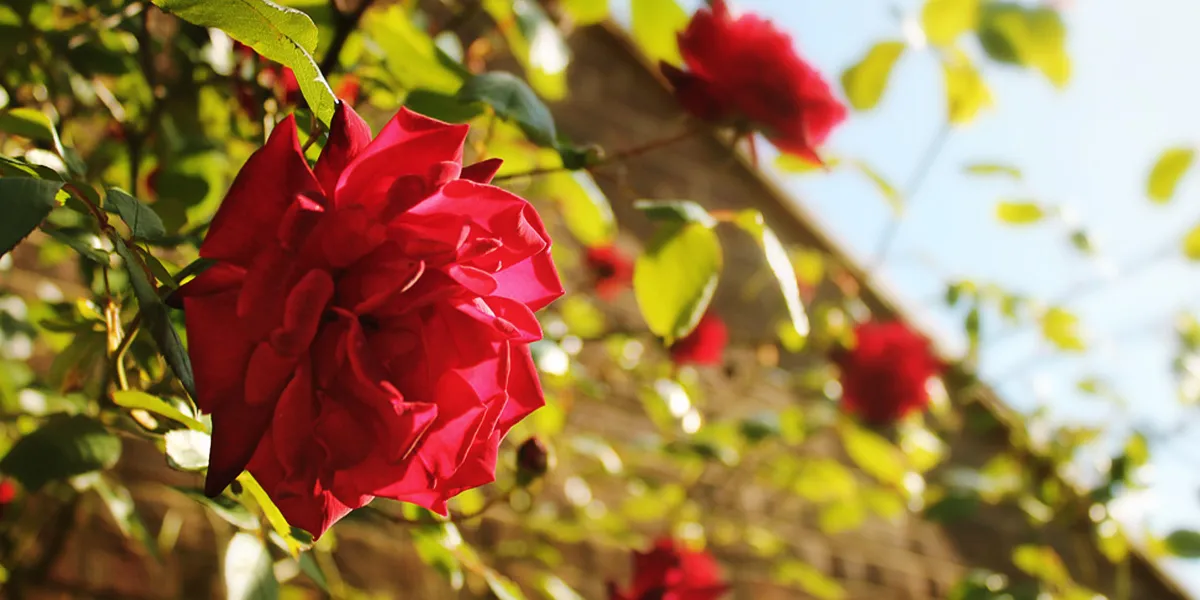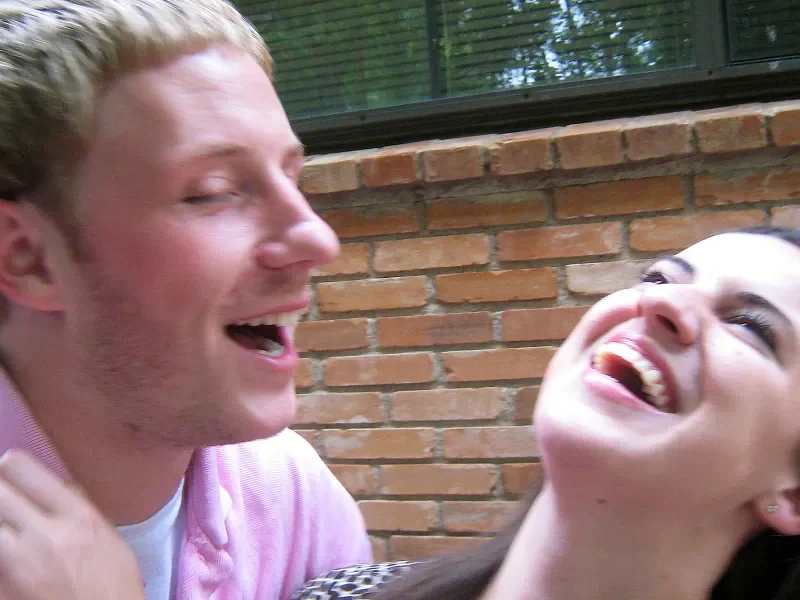A year after Grandma passed, I kept my promise and dug up her favorite rosebush. I expected roots and dirt, maybe a few old memories. What I found instead revealed a secret she took to her grave and set off a chain of events that changed everything.
My name’s Bonnie, I’m 26, and for most of my life, I’ve learned that family isn’t just about who you share blood with. It’s about who shows up when it matters. And who doesn’t?
I grew up in a small town in northern Michigan. Picture cozy porches, wood-burning stoves, and long winters that made you lean a little harder on the people around you.
My mom, Mary, was a school nurse. Her mother, Grandma Liz, was the glue that held our world together. She was never rich, but she had a quiet strength, the kind of steady presence you could count on when your knees gave out. Even her silence had a way of making the room feel warmer.
I’ve always been close to my mom, but Grandma was my safe place. I’d go to her house after school, help her fold laundry, or watch her slice apples with that same old paring knife she used since before I was born. She always smelled like Ivory soap and cinnamon.
What I didn’t realize until much later was how fractured things were between Grandma and her other daughter, my Aunt Karen.
Karen was 10 years older than Mom. She left town the second she graduated from college and only came back when it served her. She lived in a modern condo in Chicago, wore expensive perfume that lingered long after she left the room, and acted like our family was just something she’d outgrown. Still, Grandma never said a single bad word about her.
“She’s just finding her way,” she used to say, smoothing her skirt like the comment didn’t sting.
But I saw the hurt behind her eyes.
The truth is, Grandma gave Karen everything she could. She scrimped and saved to put herself through college. She helped her with rent, car repairs, and even loaned her money when she lost a job in her 30s. But it was never enough. Karen had a way of making Grandma feel small, like whatever she gave was the bare minimum and never worth appreciating.
The last time Karen came home before Grandma got sick, she spent most of the visit criticizing the wallpaper and complaining about the lack of central air. Grandma never said a word in her defense, just kept moving around the kitchen like the insults hadn’t landed. She still cooked her favorite meal, chicken and dumplings, but Karen barely touched it.
When Grandma was dying, I was 25. Watching someone you love slowly fade from the world does something to you. It chips away at you, little by little. I remember how the house felt near the end. It was quiet, but not peaceful. It was the kind of quiet that made it feel like the walls were holding their breath.
One night, she called me into her room. Her voice was so faint I had to kneel beside her bed to hear her clearly.
“Sweetheart,” she whispered, her fingers gently brushing mine, “after I’m gone, promise me you’ll move my rosebush. Dig it up after a year. Don’t forget.”
I nodded, even though my throat was tight and my chest ached. I didn’t understand why it mattered so much, but the look in her eyes was firm.
“I promise, Grandma.”
Then she added, barely audible, “And remember, the house—I’m leaving it to you and your mother. The lawyer has my will.”
Tears streamed down my face. I wanted to tell her not to worry, that everything would be fine. But we both knew better.
When she passed away, everything changed.
Karen flew in looking like she’d walked off a magazine cover. She wore a black dress that probably cost more than our entire grocery budget for the month, and her heels clicked across the church floor like they didn’t belong there.
At the wake, she walked around the house like a realtor on a property tour, eyes skimming the china cabinet, the antique dresser in the hallway.
Three days after the funeral, she showed up at the front door with a crisp folder in hand. I’ll never forget her voice, cold and almost triumphant.
“The house is mine. Mom left it to me.”
She opened the folder and held up a will I had never seen before.
Mom and I were stunned.
“What are you talking about?” Mom asked, her voice shaking. “She told us—she said she left it to us.”
Karen’s smile didn’t reach her eyes. “Well, looks like she changed her mind.”
We searched everywhere for the original will, the one Grandma had told us about. We checked the filing cabinet, her bedroom drawers, and even the attic. Nothing. It was like it had vanished into thin air.
We thought about fighting it, of course. But Karen had money, expensive lawyers, and that smug certainty that made you feel like arguing was pointless. So we packed up our things, each memory wrapped in newspaper and stuffed into cardboard boxes. The only home I’d ever known was gone.
She turned it into a rental within weeks.
Mom and I moved into a small cottage on the other side of town. It wasn’t much, but it was ours. Still, I couldn’t shake what Grandma had said about the rosebush.
It had stood in the backyard for as long as I could remember, tall and proud, with blooms the color of deep wine. It was her favorite. She used to talk to it while she watered it, as if it were an old friend.
One night, I sat on the edge of my bed, phone in hand, and stared at Karen’s name in my contacts. My stomach twisted, but I pressed call anyway.
She answered on the third ring.
“What?” she said, already impatient.
“I… I just wanted to ask if I could take Grandma’s rosebush. The one in the back. I’d like to replant it by the cottage.”
There was a pause. Then she scoffed.
“Roses? Take them, for all I care. Just don’t bother me with this nonsense.”
Click.
That was the end of that conversation.
I reached out to the tenants, two women in their 30s named Mia and Rachel. They were kind, soft-spoken, and understood more about grief than I think Karen ever had.
“Of course,” Mia said when I explained. “Just let us know when you’re coming.”
The day I returned to Grandma’s yard, it felt… wrong. Not because of the tenants. They were lovely. But the house didn’t feel like hers anymore. The energy had shifted. It was colder and distant. Even the wind felt unfamiliar, like the house no longer recognized me.
The rosebush stood in the same corner, near the white fence, just as proud as ever. I dropped to my knees, tugged on my gardening gloves, and whispered, “Alright, Grandma. I’m here.”
The soil was hard and dry. Every time I pushed the spade down, it fought me. I could hear birds in the distance, the rustle of leaves. Sweat trickled down my back as I dug deeper, hands aching.
Then it happened.
Clunk.
The sound sent a chill through me. I froze.
It wasn’t a root. It wasn’t a rock.
Heart pounding, I leaned in and started clearing the dirt with my hands, brushing it aside until I could see what was hidden beneath the rosebush.
My fingers scraped something. Wood? No… metal.
My breath caught in my throat as I realized that this wasn’t just a plant Grandma wanted moved. She had buried something.
The moment I brushed away the last of the dirt and saw the edge of that rusted iron box, my breath caught. It was wedged tightly into the soil, larger than any tin I had imagined. I dropped the spade and leaned in, heart thudding in my chest. My gloves were slick with sweat as I dug around the sides until I could finally pull the box free.
It was heavier than it looked and crusted with age. A thick, corroded clasp sealed it shut. I sat back on my heels, gripping the lock with both hands, trying to pry it open. My palms ached from the effort, but I refused to stop.
“Come on,” I whispered, gritting my teeth as I tugged again.
With a sudden snap, the clasp gave way. I stumbled slightly, nearly dropping the box, but managed to steady it on my knees. The lid creaked open.
Inside, everything was carefully arranged. A folded letter sat on top, yellowed slightly at the edges but clearly protected from the damp soil. Beneath it was a stack of official-looking documents held together with a ribbon.
The second I saw the handwriting on the envelope, I knew.
Grandma.
Tears welled in my eyes as I gently unfolded the letter, my hands trembling.
“Sweetheart,” it began, “if you’re reading this, then you did as I asked. You moved my roses. I knew you would.”
I bit my lip, blinking hard as the words blurred.
“I want you to know how much I love you, and how proud I am. I left my will with the lawyer, but knowing your aunt, I decided to make sure nothing could be twisted. Enclosed you will find a signed copy of my will, along with this letter bearing my signature. This house belongs to you and your mother. I hope, by now, your mom and aunt have reconciled, and that you’re both living happily in the home I worked so hard to keep. But if not — if things turned ugly — then here is everything you’ll need to prove the truth.”
I lowered the letter and pressed it to my chest. The dam broke.
She knew.
Grandma had seen all of this coming: the betrayal, the greed, the stolen will. And she had planned for it, right under my aunt’s nose.
I sat there in the garden for a long time, holding the box like it was some kind of sacred treasure. When I finally composed myself, I slipped the papers back inside, zipped the box into my backpack, and turned to the rosebush.
“I’ll take you with me, too,” I whispered, brushing the petals. “Let’s go home.”
I carefully dug out the rest of the roots, wrapping them in burlap and tucking them into a plastic bin. My hands were shaking, but not from exhaustion. This was something else. Hope. After so many months of bitterness and helplessness, I finally had something to hold onto.
Back at our little rental cottage, Mom was in the kitchen, rinsing dishes when I walked in. Her hair was tied up, and she looked tired, but she smiled when she saw me.
“You get the rosebush?” she asked, drying her hands.
“I got more than that,” I said quietly, pulling the box from my backpack and setting it gently on the table.
She gave me a confused look, wiping her hands on a dish towel as she sat down. I opened the lid and handed her the letter.
As she read, her fingers trembled. Her eyes scanned each line, slowly at first, then more urgently.
When she reached the last sentence, her lips parted. She placed the letter down with care and stared at the papers underneath.
“Oh my God,” she whispered, pressing a hand to her mouth. “Bonnie… this is real. This is her will. With her signature and everything.”
Tears welled up in her eyes, and before I knew it, she was crying. I hadn’t seen her cry like that since the night Grandma died. It broke something in me, but at the same time, it gave me strength.
“There’s more,” I said softly, laying out the rest of the documents.
The next day, we drove into town and made an appointment with a local attorney named Mr. Leary. He was in his early 40s, clean-cut, and had that no-nonsense energy you pray for in a lawyer. After a brief consultation, he agreed to take our case on contingency.
“I don’t usually say this in the first meeting,” he told us, flipping through the documents, “but this isn’t just a civil case. If what you’re telling me is true — and from these documents, it sure looks that way — then we’re looking at fraud. Maybe even conspiracy and forgery.”
Mom looked stunned. “Karen’s lawyer was in on it?”
Mr. Leary nodded. “If the original will was replaced with a fake, and that fake was used to claim the estate, then yes. And the paper trail here… It’s strong.”
“What do we do next?” I asked.
He leaned back in his chair. “We take them to court.”
What followed felt like a whirlwind. Mr. Leary brought in handwriting experts, document analysts, and even a forensic accountant. The signature on the forged will didn’t match Grandma’s, and the writing style was clearly different. Even worse, bank records revealed suspicious payments made to the lawyer who had handled the estate. They were hefty deposits with no clear origin.
The trial took months. Karen walked into court with her usual smugness, dressed in designer clothes and barely glancing at us. But as the evidence was laid out, piece by piece, her confidence began to crack.
I’ll never forget the look on her face when the judge announced that the original will was valid and legally binding.
The house, our house, was rightfully ours again. Not only that, but the judge ordered Karen to pay damages. That included the rent we had paid elsewhere and compensation for the emotional distress we had endured. Her entire scheme had unraveled.
The district attorney opened a criminal case, Karen’s lawyer lost his license, and Karen faced charges for fraud and perjury.
When we walked out of the courthouse, Mom squeezed my hand so tightly, I thought she might never let go.
“Grandma knew,” I said quietly. “She knew exactly what Karen would do.”
Mom nodded, eyes full of tears. “She trusted you. And she was right to.”
A few weeks later, we returned to the house.
It felt strange at first, stepping back through the door like time had reversed. The place still smelled faintly of lavender and old wood. The tenants, Mia and Rachel, had already packed up, but they met us one last time to say goodbye.
“You saved that house,” Rachel said to me, her voice soft. “Your grandma would be proud.”
I smiled. “She is.”
We worked out a deal with our old landlord to let Mia and Rachel rent the cottage at a lower rate. It felt like the right thing to do.
Then came the day I finally brought the rosebush back home.
The backyard looked the same, with the white fence and the stone path. I carried the wrapped roots to the spot near the porch and began to dig. The soil was softer this time, more welcoming.
As I placed the roots back into the earth, I felt something settle inside me.
Like closure.
I patted the soil down and stood up, brushing my hands on my jeans. The sun was starting to set, painting the sky with soft orange and pink. It was quiet, but this time the silence felt full, like the house was breathing again.
I sat on the porch steps and looked out at the little green shoots swaying gently in the breeze.
For the first time since we lost Grandma, I felt peace.
Her roses had led me to the truth. Her love had protected us, even from beyond the grave.
The house was ours again.
And so was the garden.


